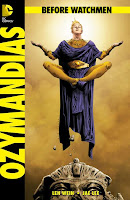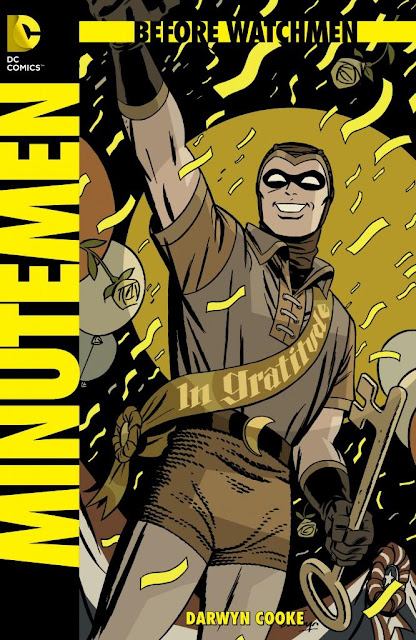"It's our responsibility as publishers to find new ways to keep all of our characters relevant," said DC Entertainment co-publishers Dan DiDio and Jim Lee in a statement. "After twenty five years, the Watchmen are classic characters whose time has come for new stories to be told.
Created by Alan Moore and Dave Gibbons, the prequels have given the blessing of Gibbons, who says, "The original series of Watchmen is the complete story that Alan Moore and I wanted to tell. However, I appreciate DC's reasons for this initiative and the wish of the artists and writers involved to pay tribute to our work. May these new additions have the success they desire."
Heat Vision: How did you become involved with Before Watchmen?
J. Michael Straczynski: The short answer is: I was asked. The long answer: Ever since Dan DiDio was handed the reins (along with Jim Lee) over at DC, he's been making bold, innovative moves that might have scared the hell out of anyone else. At a time in the industry when big events tend to be “Okay, we had Team A fight Team B last year, so this year we’re gonna have Team B fight team C!” Dan has chosen to revitalize lines, reinvent worlds and come at Watchmen head-on. It was, I think, about two years ago that he first mentioned that he was considering the idea, and he’s to be commended for fighting to make this happen.
HV: Was there any trepidation on your end to be part of this?
JMS: Anyone who sets foot into the Watchmen universe and isn’t just a little nervous should be given a few days of electroshock therapy. I’ve always considered Watchmen to be one of the best graphic novels ever written, and when it came out back in 1986 I was as blown away as everyone else. Just masterful.
The thing is, though, writers are always being asked to play in amazing universes created by other people, and you can’t let that scare you. If Darren Aronofsky can plan for a Noah’s Ark movie, Steven Spielberg can consider tackling the story of Moses, and Mel Gibson can do another Bible movie, I think it’s safe to say that the Watchmen universe is fair game, provided that you approach the work with clean hands and good intent.
HV: How do you think this will be judged and accepted considering 1) Alan Moore's stance against continuing the Watchmen universe, and 2) the sacred hold Watchmen has on readers?
JMS: The perception that these characters shouldn’t be touched by anyone other than Alan is both absolutely understandable and deeply flawed. As good as these characters are – and they are very good indeed – one could make the argument, based on durability and recognition, that Superman is the greatest comics character ever created. But I don’t hear Alan or anyone else suggesting that no one other than Shuster and Siegel should have been allowed to write Superman. Certainly Alan himself did this when he was brought on to write Swamp Thing, a seminal comics character created by Len Wein.
Leaving aside the fact that the Watchmen characters were variations on pre-existing characters created for the Charleton Comics universe, it should be pointed out that Alan has spent most of the last decade writing very good stories about characters created by other writers, including Alice (from Alice in Wonderland), Dorothy (from Wizard of normal">Oz), Wendy (from Peter Pan), as well as Captain Nemo, the Invisible Man, Jeyll and Hyde, and Professor Moriarty (used in the successful League of Extraordinary Gentlemen). I think one loses a little of the moral high ground to say, “I can write characters created by Jules Verne, H.G. Wells, Robert Louis Stevenson, Arthur Conan Doyle and Frank Baum, but it’s wrong for anyone else to write my characters.”
The whole point of having great characters is the opportunity to explore them more deeply with time, re-interpreting them for each new age. That DC allowed these characters to sit on a shelf for over two decades as a show of respect is salutary, but there comes a time when good characters have to re-enter the world to teach us something about ourselves in the present.
HV: Why do a prequel and not a sequel?
JMS: Alan spends a lot of time in the original Watchmen teasing out details of the history of our characters before the time in which the graphic novel is set. In so doing, he gave us an excellent road map that would let us hew more truly to the characters than by telling a story that takes place after those events. The first time all of us got together in New York to solidify the storyline, we each had copies of Watchmen in hand and whenever a question was raised about what happened to whom and when, we’d flip through looking for the slightest clue. I joked at the time that it looked a lot like Saturday afternoon Bible Study.
UPDATED FROM DC'S THE SOURCE:
BEFORE WATCHMEN includes:
RORSCHACH (4 issues) – Writer: Brian Azzarello. Artist: Lee Bermejo
MINUTEMEN (6 issues) – Writer/Artist: Darwyn Cooke
COMEDIAN (6 issues) – Writer: Brian Azzarello. Artist: J.G. Jones
DR. MANHATTAN (4 issues) – Writer: J. Michael Straczynski. Artist: Adam Hughes
NITE OWL (4 issues) – Writer: J. Michael Straczynski. Artists: Andy and Joe Kubert
OZYMANDIAS (6 issues) – Writer: Len Wein. Artist: Jae Lee
SILK SPECTRE (4 issues) – Writer: Darwyn Cooke. Artist: Amanda Conner
Each week, a new issue will be released, and will feature a two-page back-up story called CURSE OF THE CRIMSON CORSAIR, written by original series editor Len Wein and with art by original series colorist John Higgins. There will also be a single issue, BEFORE WATCHMEN: EPILOGUE, featuring the work of various writers and artists, and a CRIMSON CORSAIR story by Wein and Higgins.









No comments:
Post a Comment